HOUSING ANALYSIS
Where Are The Shortfalls and Surpluses?
New research from Moody’s Analytics, PolicyMap, and Reinvestment Fund offers the most detailed, census tract-level analysis to date of the U.S. housing shortage, revealing a critical gap in rental housing, especially in moderate and middle-income areas. While high-income neighborhoods in large cities show a rental surplus and low-income areas face more modest shortfalls, it’s the middle that has been left behind. To learn more, explore the maps and data on PolicyMap.
View Data on PolicyMap
Fill in the form to explore the census tract-level housing shortage data across 350 American cities with populations over 100,000.
DOWNLOAD THE PAPER
Bringing the Housing Shortage Into Sharper Focus
Bringing the Housing Shortage Into Sharper Focus identifies this gap as a lack of “Workforce Rental” housing, highlighting a nationwide need that is both widespread and overlooked. The collaborative, tract-level analysis from Moody’s Analytics, PolicyMap, and Reinvestment Fund provides policymakers, developers, and housing advocates with the data needed to target solutions where they’re most urgently required.
Download to Dig Deeper
Fill in the form to download the paper to dig deeper into the methodology, research results, and policy implications.

About The Authors
Cristian
deRitis
Moody’s Analytics
Deputy Chief Economist
Maggie
McCullough
PolicyMap
CEO & Founder
Ira
Goldstein
Reinvestment Fund
Senior Advisor, Policy Solutions
Jim
Parrott
Co-owner at Parrott Ryan Advisors
Nonresident Fellow at Urban Institute
Mark
Zandi
Moody’s Analytics
Chief Economist
Explore Housing Shortfalls & Surpluses in Your City
PolicyMap users can explore housing shortage data across 350 American cities with populations over 100,000. Dive into tract-level insights to see exactly where rental and owner gaps exist and how severe the need is estimated to be. Use these maps to inform planning, investment, and policy decisions in the communities you serve. View the data in PolicyMap: total housing unit gap, total owner housing unit gap, and total rental housing unit gap.
Total Owner Housing Unit Gap in Philadelphia, PA
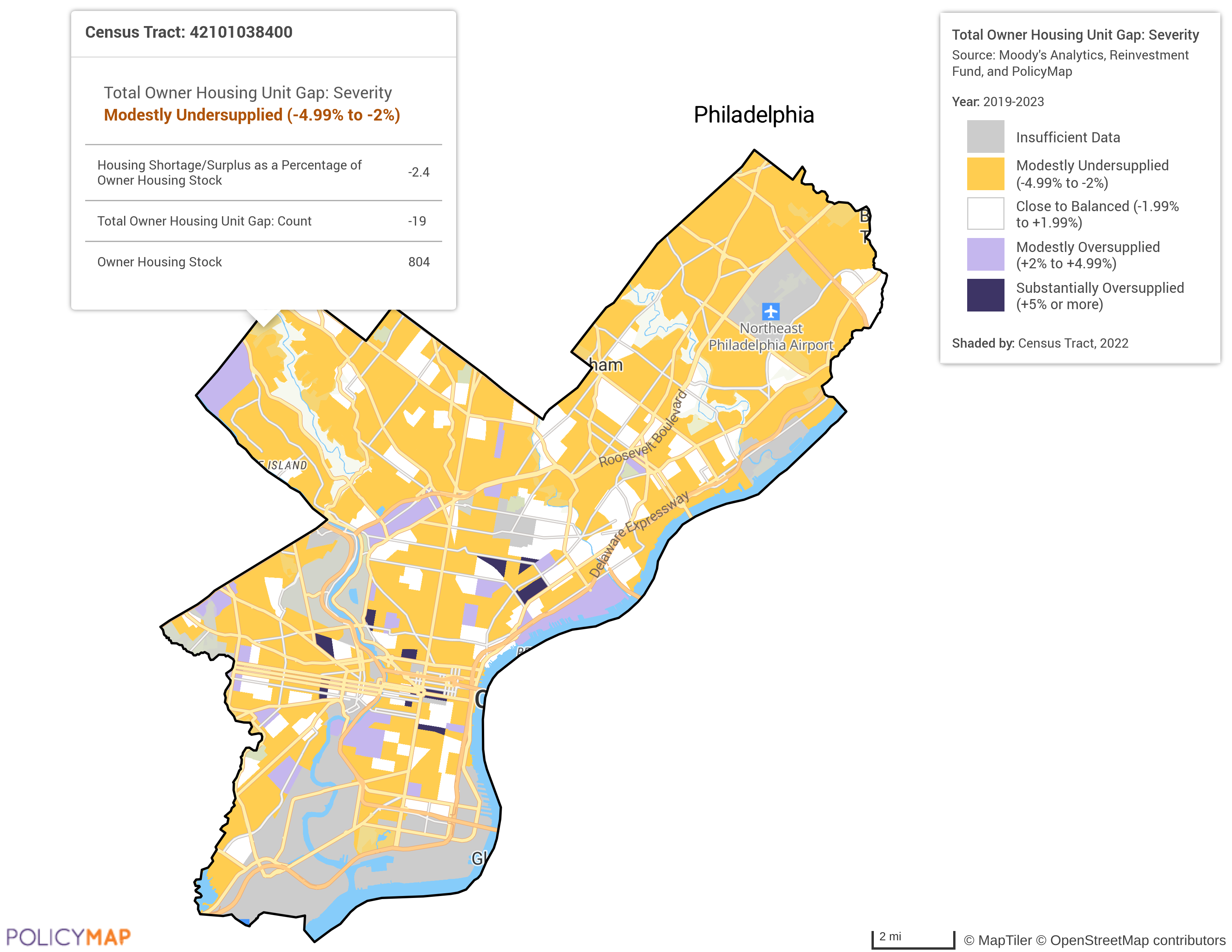
Sources: PolicyMap, Reinvestment Fund, Moody’s Analytics
Total Rental Housing Unit Gap in Philadelphia, PA
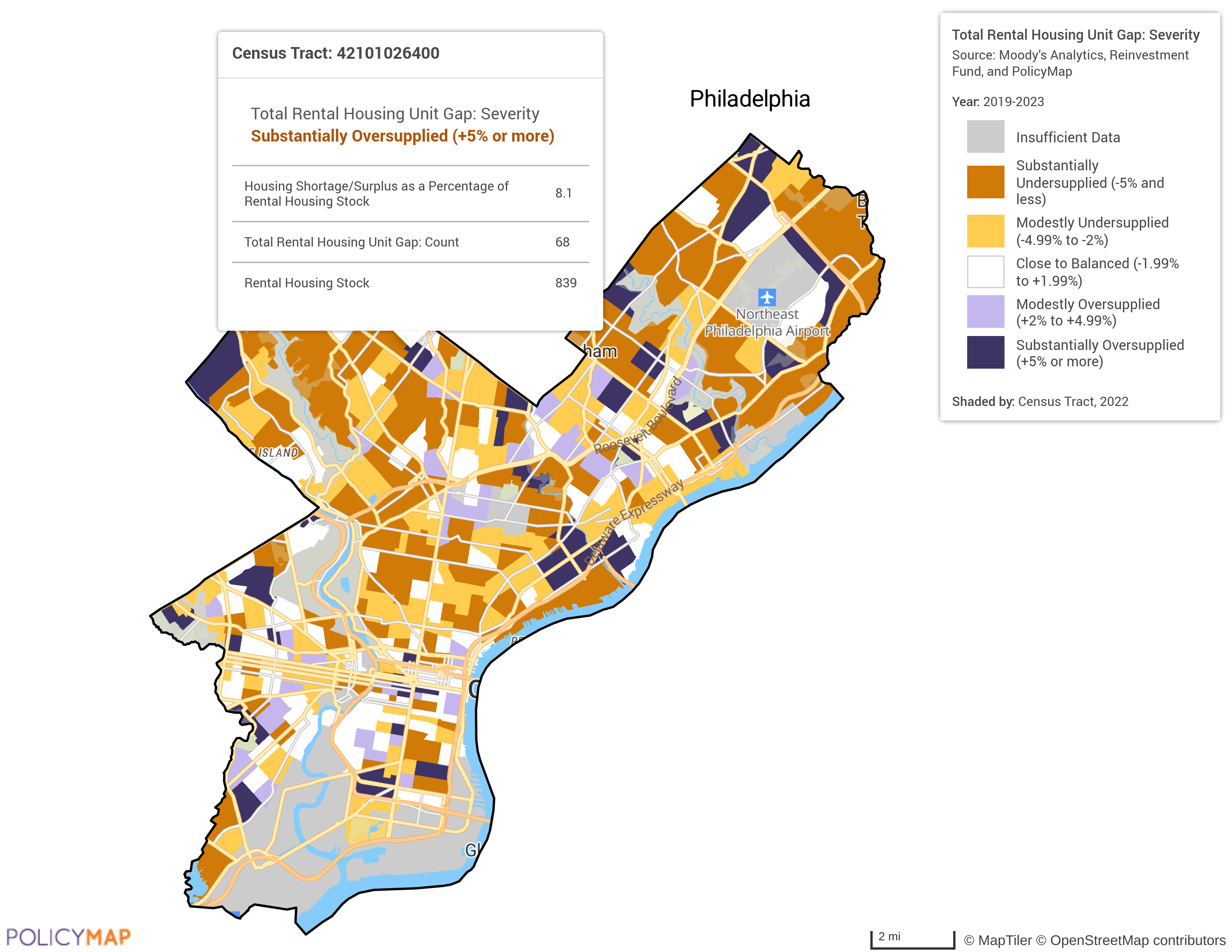
Sources: PolicyMap, Reinvestment Fund, Moody’s Analytics
DEMO REQUEST
See PolicyMap In Action
Curious how PolicyMap can support your work? Request a demo to learn how this housing gap data can be layered with other key indicators such as changes in population, home sale prices, or tax incentives to strategically target investments and guide planning efforts. Learn too how to upload local data to uncover even deeper insights and drive better decisions. Fill out the form and a member of our team will be in touch shortly.
Dig Deeper Into the Findings

IN THE NEWS
A deep dive into the housing shortage
What does America’s housing crisis look like—down to your neighborhood?
The New York Times, in its DealBook newsletter, covers groundbreaking new research from Moody’s Analytics, PolicyMap, and Reinvestment Fund. This study provides the most detailed analysis to date of the U.S. housing shortage at the census tract level, uncovering a significant gap in rental housing, particularly in moderate- and middle-income communities.
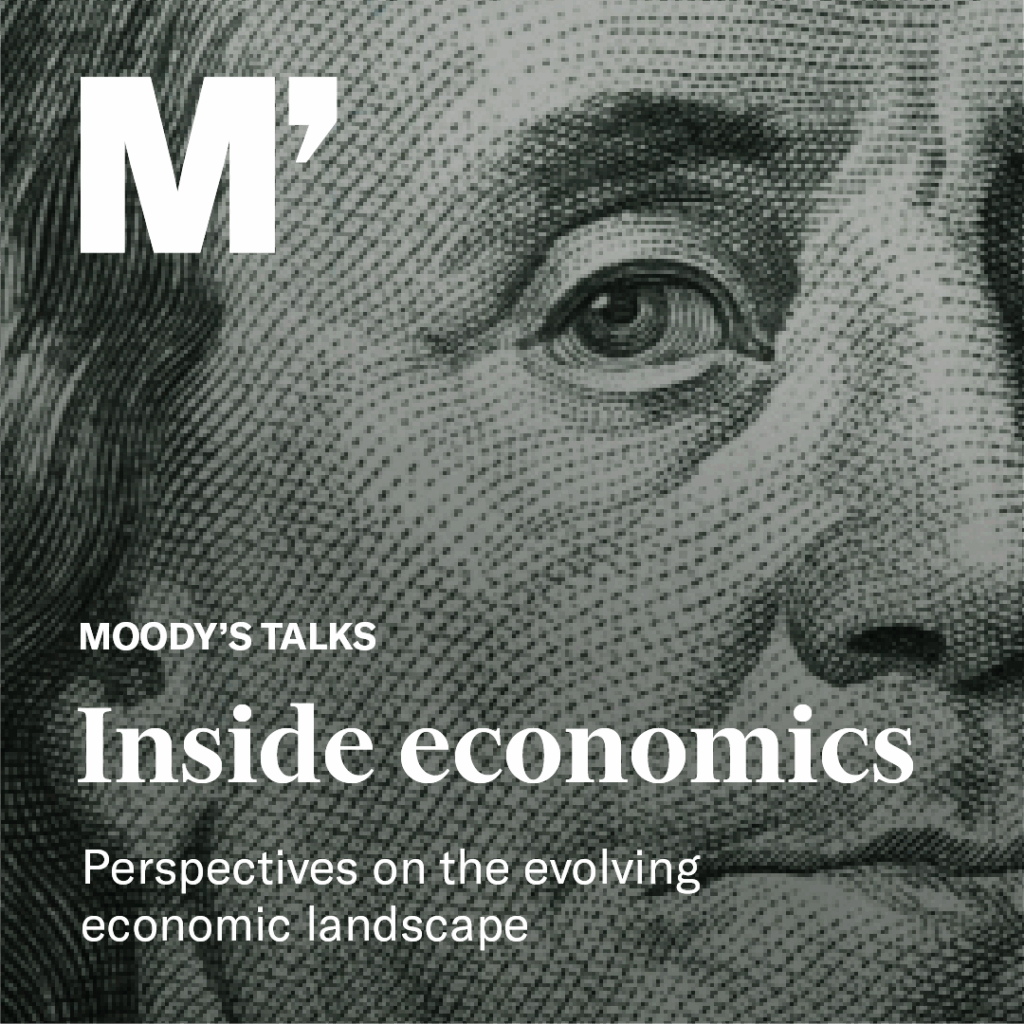
PODCAST
Housers on the Housing Shortage
Moody’s Analytics Mark Zandi and Cris deRitis are joined by Ira Goldstein from The Reinvestment Fund, Maggie McCullough from PolicyMap, and Jim Parrott from the Urban Institute to discuss their new study that takes a deep dive into understanding the nature of the decade-long housing shortfall. This housing crisis has driven up house prices and rents, and undermined housing affordability. But despite the heightened political attention on the problem, there remains confusion over its true scale and scope. This team of self-avowed housers dissect the shortage down to the census tract and come to some surprising conclusions.
IN THE NEWS
Moody’s report: Georgia housing deficit ‘acute,’ short 41,000 homes
The Moody’s report concludes there is a national deficit of 2 million homes. Georgia and other Southern states have some of the worst housing shortages. Written by Matt Reynolds, housing reporter for The Atlanta Journal-Constitution‘s local government team.

ON THE BLOG
Localized Housing Unit Gap Measures Support $2 Billion Housing Plan in Philadelphia
Philadelphia’s $2 billion HOME initiative takes a data-driven approach to solving the city’s housing crisis, targeting the creation and preservation of 30,000 units. With housing gap estimates from Moody’s Analytics, PolicyMap, and Reinvestment Fund guiding every step, the plan aligns funding, location, and affordability with precision. See the data that is driving real-world change in one of America’s most housing-challenged cities.

ON DEMAND WEBINAR
A Focus on the Housing Shortage
The U.S. faces a decade-long housing shortfall, driving up rents and home prices while worsening affordability nationwide. Despite growing political attention, confusion over the scale and nature of the crisis persists, with estimates often conflating different parts of the housing market. This discussion clarifies the shortage’s scope, examines local impacts, and explores how supply and demand shape affordability, providing a clearer foundation for policymakers to address the challenge.
DEMO REQUEST
See PolicyMap In Action
Curious how PolicyMap can support your work? Request a demo to learn how this housing gap data can be layered with other key indicators such as changes in population, home sale prices, or tax incentives to strategically target investments and guide planning efforts. Learn too how to upload local data to uncover even deeper insights and drive better decisions. Fill out the form and a member of our team will be in touch shortly.
PARTNERING FOR INSIGHT
Research Collaborators
About Moody’s Analytics
In an increasingly interconnected and complex operating environment, organizations face challenges decoding the intricacies of the global economy. The Moody’s Analytics Economics team delivers timely and in-depth data, forecasts and analysis of the global economy’s latest developments and trends—empowering organizations and policymakers to identify and manage risks, seize new growth opportunities, respond to geopolitical threats, and thrive in an ever-evolving landscape. The Economics team has more than 35 years of dedicated experience in economic forecasting and research. Leveraging our team’s global coverage and local expertise, our economists provide unrivalled insight on pivotal economic topics, including labor markets, housing, commercial real estate, and consumer spending, among others, across the Americas, Europe, the Middle East, and APAC. We also provide real-time monitoring of economic indicators, scenario analysis, and thought leadership on critical themes such as monetary and fiscal policy and sovereign risk—all of which support decision-makers and policymakers in strategic planning, product and sales forecasting, stress-testing, credit risk management, and investment decisions. By combining economic modeling, expansive data resources, and innovative technology solutions, we equip business leaders with critical insights to navigate the complexities of an ever-changing economic landscape. Recognized for our industry-leading solutions and commitment to quality, client service, and integrity, more than 1,000 organizations worldwide—including multinational corporations, governments, financial institutions, real estate firms, and professional investors—trust us to help them turn today’s risks into tomorrow’s opportunities. Learn how Moody’s Analytics can help drive your success at www. www.economy.com.

About PolicyMap
PolicyMap empowers organizations with unparalleled access to comprehensive mapping and data analytics tools. Our data warehouse contains 75,000+ geographic indicators across demographics, housing, economic conditions, infrastructure, education, environment, health, and social determinants of health from more than 170 public and proprietary sources. Our data is available via our SaaS mapping platform, embedded mapping options, or a data license. With PolicyMap, users can create custom maps in seconds, layer multiple indicators, upload and download data, publish and share maps, build dashboards, and generate reports.
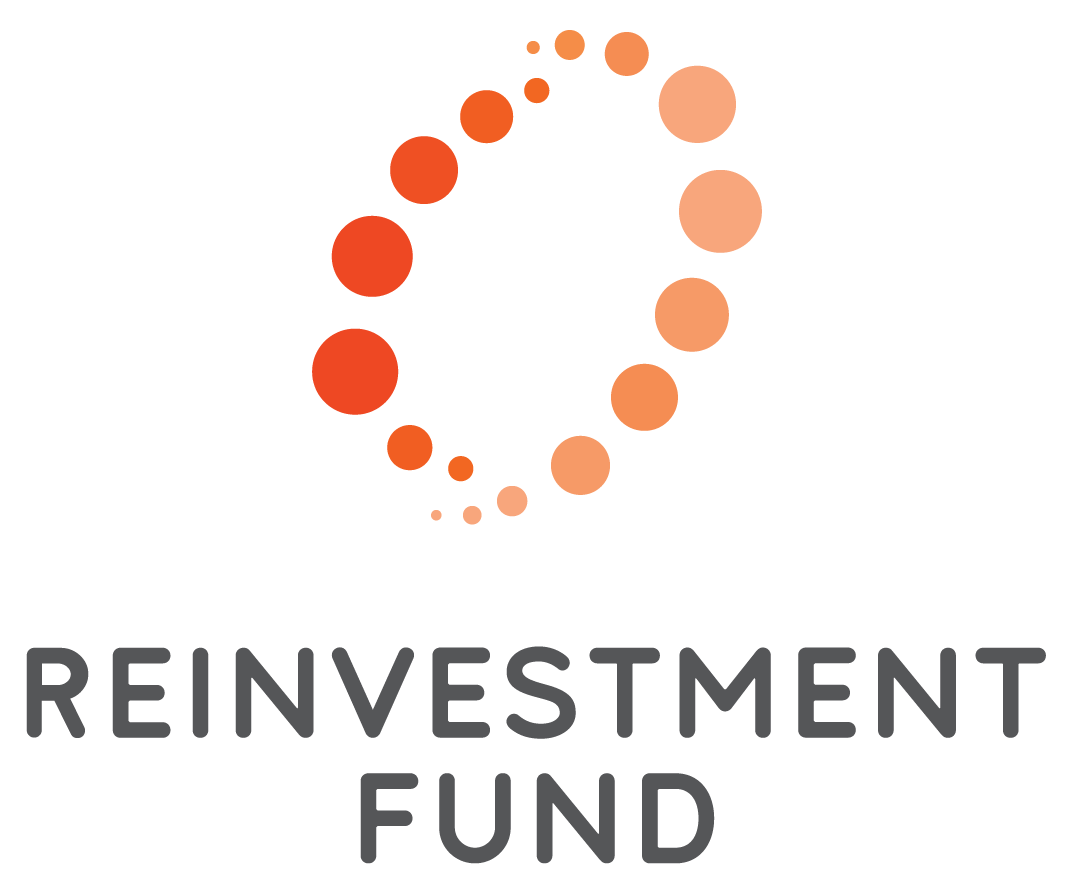
About Reinvestment Fund
Across the country, many communities face barriers to accessing the fundamental building blocks that create the foundation for families to thrive. Reinvestment Fund is a mission-driven financial institution committed to making communities work for all people.
As a federally certified community development financial institution (CDFI), we bring financial and analytical tools to partnerships that work to ensure that everyone has access to essential opportunities: affordable places to live, access to nutritious food and health care, schools where their children can flourish, and strong, local businesses that support jobs.
We use data to understand markets, communities, and impediments to opportunity—and how investment and policy decisions can have the most powerful impact.
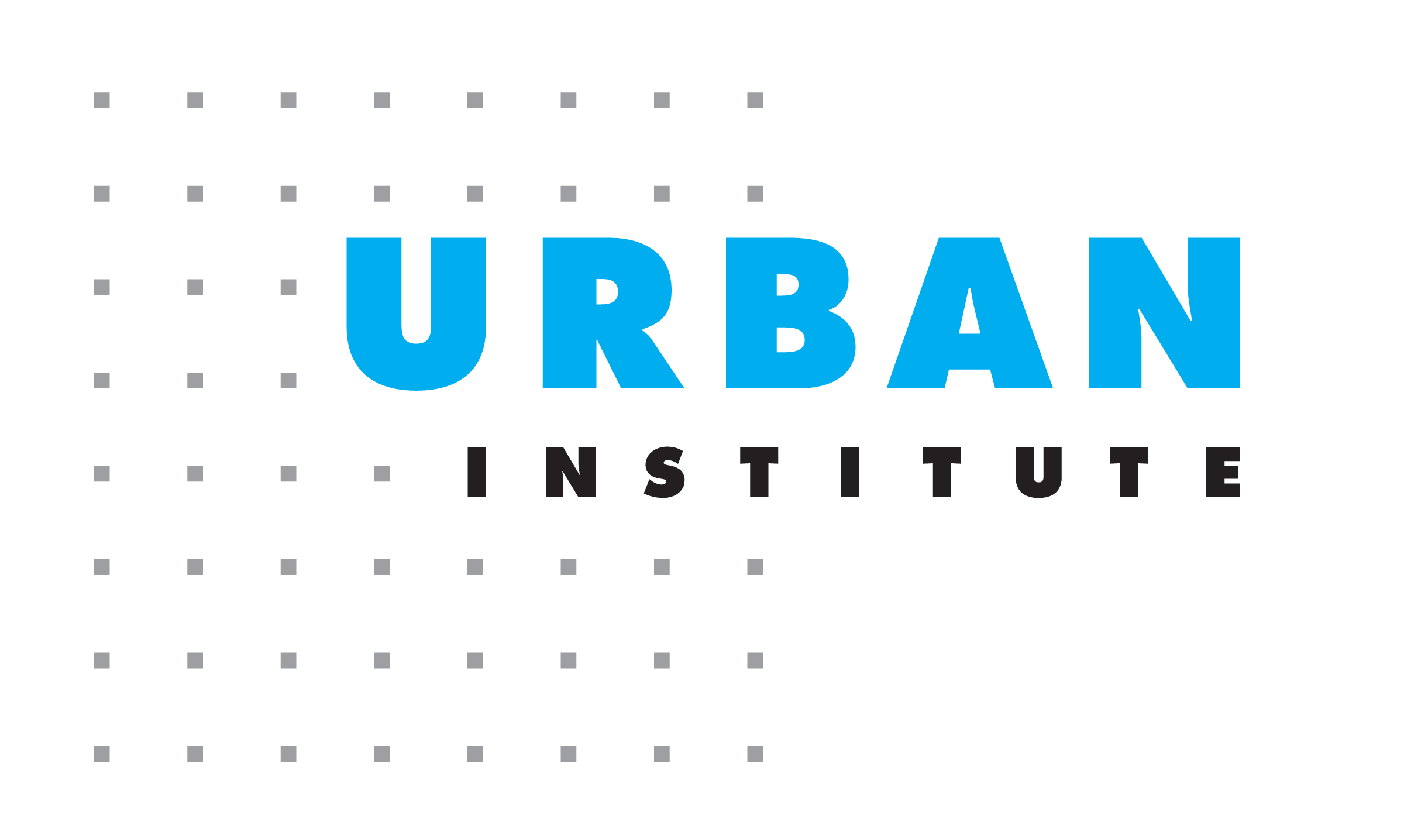
About Urban Institute
The Urban Institute is a nonprofit research organization founded on one simple idea: To improve lives and strengthen communities, we need practices and policies that work. For more than 50 years, that has been our charge. By equipping changemakers with evidence and solutions, together we can create a future where every person and community has the opportunity and power to thrive.